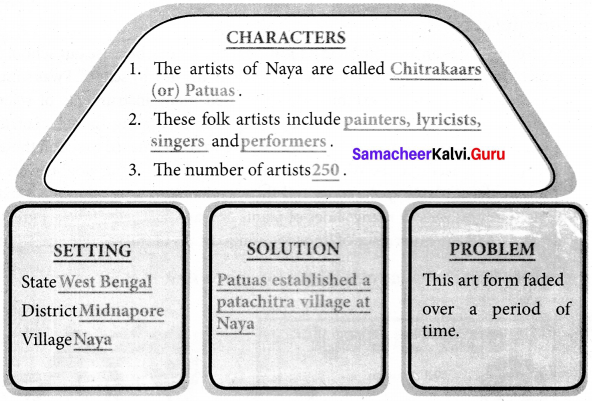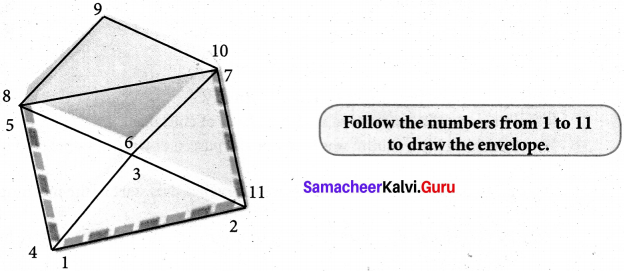Students can Download English Lesson 2 Naya – The Home of Chitrakaars Questions and Answers, Summary, Notes Pdf, Activity, Samacheer Kalvi 7th English Book Solutions Guide Pdf helps you to revise the complete Tamilnadu State Board New Syllabus and score more marks in your examinations..
Tamilnadu Samacheer Kalvi 7th English Solutions Term 2 Supplementary Chapter 2 Naya – The Home of Chitrakaars
A. Fill in the blanks choosing the words / phrases given in the box.
(Midnapore folk art chitrakaars Pata Chitra painted scrolls unrolled )
Naya is a quaint little village in West Bengal’s Midnapore district. However, it is not an ordinary village. Around 250 patuas or Chitrakaars or artists live there. These folk artistes are painters, lyricists, singers and performers all rolled into one. They practise an ancientfolk art called Pata Chitra. This is a type of storytelling using Painted scrolls . The scrolls had stories painted on them and the artists sang the story as they unrolled the scroll. This art has been practised since the 13th century.
![]()
B. Write the apt word for the given phrases.
- The traditional folk art of West Bengal
- Annual festival to celebrate the success of local artists
- The other name of story tellers
- Conservation of trees, female infanticide etc
Answer:
- Pata Chitra
- Pot Maya
- tm Patuas (or) Chitrakaars
- Social messages
C. Fill in the details of the mind map

D. The process of making a patta is jumbled. Read the sentence and number them in proper order.
- A Patta is created by painting on a canvas.
- It is made by stitching multiple sheets of poster paper together.
- Jute fibre canvas was used in the olden days.
- Plant-based colours and lampblack are mixed in coconut shells.
- The sap of the wood apple tree acts as glue.
- A thin cotton cloth is glued to the back of the painting for a long life.
- The completed scrolls are dried in the sun.
- Finally, they are stored in rolled-up bundles.
Answer:
- 1
- 3
- 2
- 4
- 5
- 6
- 7
- 8
E. Write a few sentences about the Pot Maya festival.
Answer:
Pot Maya Festival
Pot Maya Festival is a three-day annual festival which is held to celebrate the success of the local artists. Every year, it is held in November. This festival exhibits modern paintings as well as scrolls dating back hundreds of years. The villagers paint the mud walls of their houses with colourful Patachitra motifs and hang scrolls on ropes in the courtyards. They also clean up the surroundings and decorate the entire village with flowers to get ready for visitors. Patuas also house the visitors in their homes and intents.
![]()
Project
F. Make a diary entry about your visit to the Science Exhibition.
Answer:
29th August 2019
Dear diary,
Today, it was an awesome and educational day for me, because our school teachers took us to the Science Exhibition which was held in the nearby school. I was so surprised by seeing those science exhibits, students used many instruments of science and technology. They demonstrated many things like separating funnel, centrifugation process, sublimation, chromatography, etc. We were all amazed to see all these things. They were so useful to us. We learned many things. Some of our doubts were cleared. The way the students spoke to us and their explanations was adorable. Next, in the Biology room, we saw many slides of plants and animal cells. It was a great day for us, as we had the experience of knowing some details of science and technology.
G. Design a certificate, a badge, or a medal for sports
Answer:

Connecting To Self
H. Draw the pictures in the given boxes using the clues.

- The snake is next to the owl.
- The owl is not next to the bird.
- The kite is on the right.
- The owl is between the snake and the kite.
Now, where is the bird?
Answer:
The bird is next to the Kite.
I. Draw an envelope with the flap open without lifting your pen from the paper. Indicate the numbers to show how it was drawn.
Answer:

Follow the numbers from 1 to 11 to draw the envelope
Step To Success
J. Find their group name and write them in the blanks.
(literary art martial art visual art textile art performing art)
- Kuchupudi, Bangra, Dandia, _______
- prose, poetry, drama, novel _______
- photography, film making, sculpture _______
- Karate, Kungfu, Capoeira _______
- weaving , embroidery, carpet designing _______
Answer:
- performing art
- literary art
- visual art
- martial art
- textile art
Naya – The Home of Chitrakaars Additional Questions
I. Choose the Correct Answers (MCQ).
Question 1.
Around ________ patuas or chitrakaars or artists live there.
(a) 350
(b) 300
(c) 250
(d) 150
Answer:
(c) 250
Question 2.
This is a type of storytelling using ________ scrolls.
(a) painted
(b) printed
(c) water
(d) leather
Answer:
(a) painted
![]()
Question 3.
They also paint images of ________ subjects.
(a) modern
(b) traditional
(c) unusual
(d) social
Answer:
(b) traditional
Question 4.
Since ________, an annual three-day festival Pot Maya has been held.
(a) 2011
(b) 2010
(c) 2015
(d) 2013
Answer:
(b) 2010
![]()
Question 5.
The Patuas hold ________ on natural colour extraction from sources.
(a) demonstrations
(b) skits
(c) exhibition
(d) classes
Answer:
(a) demonstrations
II. Identify the Character / Speaker.
- Their stories included mythological stories.
- They also clean up the surroundings and decorate the entire village with flowers.
- They also use a lamp black.
- A few of them still sing their self-composed songs.
Answer:
- Patuas
- The villagers
- Patuas
- Patuas
III. Write True or False against each statement,
- This art has been practised since the 5th century.
- Over time, people lost interest in the art form of chitrakaar.
- The Patachitra art tradition was traditionally passed down from uncle to father.
- Musical and dance performances by well-known artists start in the morning.
- During the festival, the quiet hamlet is transformed into a vibrant cultural hub.
Answer:
- False
- True
- False
- False
- True
IV. Very Short Questions with Answers.
Question 1.
Where was the village of Naya located?
Answer:
Naya village was located in West Bengal’s Midnapore district.
![]()
Question 2.
What did the Patuas establish?
Answer:
The Patuas established a Patachitra village at Naya.
Question 3.
Who is taking up the traditional art form as a passion and profession?
Answer:
The youngsters are taking up the traditional art form as a passion and profession.
Question 4.
What acts like glue in the painting?
Answer:
The sap of the bel tree (wood apple) acts as glue.
Question 5.
Where do Patuas house the visitors?
Answer:
The Patuas house the visitor in their own homes and intents.
V. Short Questions with Answers,
Question 1.
What do you know about ‘Patachitra’?
Answer:
Ancient folk art is called Patachitra. This is a type of storytelling using painted scrolls. The scrolls have stories painted on them. It has been practised since the 13th century.
Question 2.
What did the Patuas adapt to keep their art alive in the modern world? *
Answer:
The Patuas adapted their skills and themes to the times. An innovative step they took to do this was to establish a Patachitra village at Naya.
![]()
Question 3.
What did the artists get in return for their performance?
Answer:
The artists received rice, vegetables, and money in return for their performance of singing a Pater gaan or the story songs.
Question 4.
On what was a traditional Patta painted? How it is made now?
Answer:
A traditional patta was painted on a canvas made of Jute fibre. Now, it is made by stitching together sheets of commercial poster paper.
Question 5.
What is an unforgettable experience?
Answer:
Watching a Patua singing gently, as he or she unfurls the scrolls is an unforgettable experience.
VI. Rearrange the Jumbled Sentences.
Question 1.
What types of paintings do the Patuas make today?
Answer:
Today, the Patuas make rectangular and square-shaped paintings of different sizes. Social messages like conservation of trees, female infanticide, child – trafficking, and AIDS awareness figure in their paintings. They also paint images of traditional subjects such as a cat eating a lobster or fish, tigers, rows of cows or white owls. The Patuas today do not make too many long story scrolls. A few of them still sing their self-composed songs, but only on demand.
![]()
Question 2.
How is the village portrayed, during the Pot Maya festival?
Answer:
During the festival, the quiet hamlet is transformed into a vibrant cultural hub, where visitors can learn about the craft of Patachitra. Several workshops are held, stories are told, afid different types of Pata artwork are displayed for sale. Musical and dance performances by well-known artists start in the evening and go on well into the night. The Patuas hold demonstrations on natural colour extraction from sources.
VII. Rearrange the jumbled sentences
A
1. This is a type of storytelling using painted scrolls.
2. This art has been practised since the 13th century.
3. Naya is a quaint little village in West Bengal.
4. Around 250 Patuas or Chitrakaars or artists live there.
5. They practise an ancient folk art called Pata Chitra.
Answer:
3. Naya is a quaint little village in West Bengal.
4. Around 250 Patuas or Chitrakaars or artists live there.
5. They practise an ancient folk art called Pata Chitra.
1. This is a type of storytelling using painted scrolls.
2. This art has been practised since the 13th century.
B.
1. Their stories included mythological stories and tribal folklore.
2. Traditionally, such storytellers took their painted scrolls from village to village.
3. Nowadays, the artists sing of social messages and contemporary events as well.
4. In every village, they unrolled the scrolls frame by frame and sang Pater gaan or the story songs.
5. In return for their performance, the villages gave them rice, vegetables, and money.
Answer:
2. Traditionally, such storytellers took their painted scrolls from village to village.
4. In every village, they unrolled the scrolls frame by frame and sang Pater gaan or the story songs.
5. In return for their performance, the villages gave them rice, vegetables, and money.
1. Their stories included mythological stories and tribal folklore.
3. Nowadays, the artists sing of social messages and contemporary events as well.
VIII. Read the passage and answer the questions.
A.
The patachitra art tradition was traditionally passed down from father to son, but today many patua women have also taken up the craft. Under an initiative Art for Livelihood’, some of these women are leading local development.
Question 1.
To whom does Patachitra traditionally pass down?
Answer:
It is traditionally passed down from the father to the son.
![]()
Question 2.
Who has also taken up the craft today?
Answer:
Many Patua women have also taken up the craft today.
Question 3.
What is the name of the art mentioned here?
Answer:
The name of the art is ‘Art for livelihood’.
B.
Watching a patua singing gently as he or she unfurls the scrolls is an unforgettable experience. The play of light and shadow from the oil lamps on the soft colours and delicate imagery of the paintings is magical. If you are interested in traditional art and crafts, do visit this unique village. It will be a delightful experience in a beautiful rural setting.
Question 1.
How do the Patuas sing?
Answer:
The Patuas sing gently as they unfurl the scrolls.
Question 2.
What is magical according to the author?
Answer:
The play of light and shadow from the oil lamps on the soft colours and delicate imagery of the paintings is magical.
Question 3.
What will be a delightful experience?
Answer:
Visiting the unique village of Naya will be a delightful experience.
![]()
Naya – The Home of Chitrakaars Summary
Naya is a little village in West Bengal’s Midnapore district. Nearly 250 Chitrakaars known as ‘Patuas’ practice an ancient folk art called ‘Pata Chitra’. They were painters, lyricists, singers, and dance performers. ‘Pata Chitra’ is a type of story-telling using painted scrolls. These storytellers sang songs moving from village to village. In course of time, people lost interest in this art form. Patuas established a Patachitra village at Naya to keep their art alive. The efforts to receive their artistic heritage was fruitful.
A traditional Pata was created by painting on a canvas. Today, the Patras make rectangular and square-shaped paintings of different sizes. Social messages figure out in these paintings. Since 2010 an annual three-day festival, ‘Pot Maya’ has been held to celebrate the success of the local artists. During the festival, several workshops are held, stories are told and different types Of Pata artwork are displayed for sale. They also hold demonstrations on natural colour extraction from sources. Watching them singing gently is an unforgettable experience. The play of light and shadow from the oil lamps on the soft colours and paintings is magical.